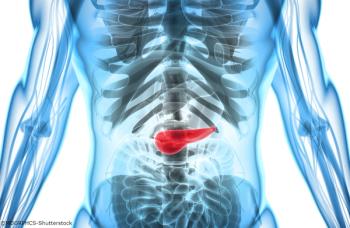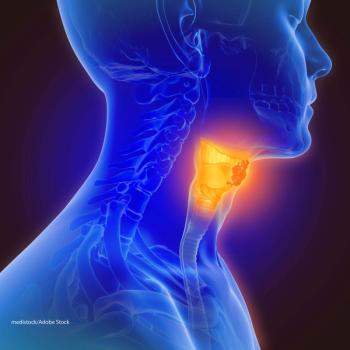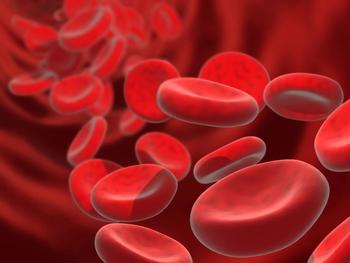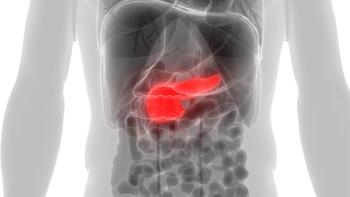
No TRAEs leading to dose discontinuation, DLTs, or belantamab-related corneal events above grade 1 occurred with belantamab in multiple myeloma.

Your AI-Trained Oncology Knowledge Connection!


No TRAEs leading to dose discontinuation, DLTs, or belantamab-related corneal events above grade 1 occurred with belantamab in multiple myeloma.

Updated findings from AURIGA support the value of adding subcutaneous daratumumab to lenalidomide maintenance in MRD-positive NDMM after transplant.

Gary Steinberg, MD, compared the AE profile of the gemcitabine intravesical system for BCG-unresponsive NMIBC with other intravesical therapies.

Phase 1b/2 BGB-11417-105 trial data showed low rates of high-grade infection and hematologic toxicity with sonrotoclax-based therapy in multiple myeloma.

Patients with PDAC and non-GOF mutations had less favorable OS and DFS outcomes in various instances compared with those who had wild-type genes or GOF mutations.

Belantamab mafodotin plus lenalidomide and dexamethasone yielded a stringent CR of 42.9% in patients with newly diagnosed multiple myeloma.

Daratumumab, lenalidomide, ixazomib, and dexamethasone yielded PFS/OS outcomes in transplant-ineligible, newly diagnosed myeloma.

The agency has recommended approval for subcutaneous pembrolizumab in all previous solid tumor indications, and for pembrolizumab in recurrent HNSCC.

In patients with LS-SCLC who were ineligible for a prophylactic cranial irradiation, toripalimab appeared to decrease the progression of brain metastases.

Data from the TANDEMM trial show enduring responses with concurrent anti-GPRC5D and anti-BCMA therapy in relapsed/refractory multiple myeloma.

Data from the phase 3 3475A-D77 trial support the FDA approval of subcutaneous pembrolizumab across different pediatric and adult solid tumor indications.

Greater regulatory and policy clarity may better optimize clinician use of artificial intelligence in treating patients with cancer.

The long-term safety profile of equecabtagene autoleucel was manageable, with no new safety signals identified in those with multiple myeloma.

As a 1-time dose, arlo-cel yielded promising efficacy and safety for patients with previously treated relapsed/refractory multiple myeloma.

Sally Werner, RN, BSN, MSHA, highlights the importance of using education, navigation programs, and caregiver support to help during CAR T-Cell Therapy treatment.

The safety profile of teclistamab-based therapy in the MajesTEC-5 trial was expected based on the known compounds employed in each combination.

It may be critical to sequence BCL-2 inhibitors with BTK inhibitors for patients with mantle cell lymphoma in the relapsed/refractory setting.

Gary Steinberg, MD, discusses the clinical significance of the new FDA-approved gemcitabine intravesical system for BCG-unresponsive NMIBC.

Panelists and presenters attending World GU 2025 shared their perspectives on optimizing the management of prostate, kidney, and bladder cancers.

An independent data monitoring committee recommended the continuation of the phase 2 AMPLIFY-7P trial evaluating ELI-002 7P in PDAC in August 2025.

Additional time is necessary to confirm the depth and durability of responses observed in the phase 1 CAMMA 1 study.

As noted in the letters, "ACRO’s comments seek to ensure ongoing access to high-quality, state-of-the-art radiation oncology services."

Attitudes toward the use of AI in health care were split 50/50, according to a recent survey conducted by the Cancer Support Community.

Clinicians discuss the best treatment options for a 46-year-old woman diagnosed with BRAF+ melanoma.

Reducing the manufacturing time of CAR T-cell therapy may have a big impact on the treatment of patients with mantle cell lymphoma.

Responses observed with the elranatamab-based regimen in the MagnetisMM-6 trial are anticipated to deepen with longer follow-up.

Sally Werner, RN, BSN, MSHA, discusses the crucial role of psychosocial oncology in cancer care, including how clinicians and administrators can advocate for these vital services.

The next-generation ADC, CRB-701, demonstrated an emerging objective response rate of 57% in a subgroup of patients with HNSCC.

Clinical benefit with the investigational agent was reported among 48% of patients with solid tumors at or above the therapeutic dose threshold.

Future biomarker analysis will include correlation of efficacy with SLFN11 expression and with markers of DNA damage repair.